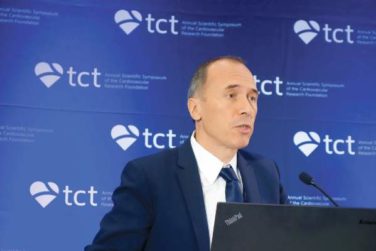AT ESMO 2017
MADRID (FRONTLINE MEDICAL NEWS) – A combination of two immune checkpoint inhibitors was superior to the tyrosine kinase inhibitor (TKI) sunitinib (Sutent) in first-line treatment of patients with advanced or metastatic renal cell carcinoma (RCC), investigators reported
Median overall survival (OS) among 425 patients with intermediate- or poor-risk treatment-naive advanced/metastatic clear-cell RCC treated with the combination of nivolumab (Opdivo) and ipilimumab (Yervoy) was not reached after 32 months of follow-up. In contrast, the median OS for 422 patients treated with sunitinib was 26 months, reported Bernard Escudier, MD from the Institut Gustave Roussy in Villejuif, France.
Investigators previously had reported that progression-free survival (PFS), which, together with overall response rate (ORR), constituted the other coprimary endpoint, also favored the checkpoint inhibitors, with a median of 11.6 months versus 8.4 months for sunitinib (P = .0331), he reported at the European Society of Medical Oncology Congress.
Similarly tipping the balance toward the combination, the ORR was 42%, compared with 27% in the sunitinib group (P less than .0001).
“These results support the use of nivo/ipi [nivolumab/ipilimumab] as a new first-line standard of care option for patients with advanced renal cell carcinoma,” Dr. Escudier said at a briefing prior to presenting the data in a presidential symposium.
Patients with treatment-naive advanced or metastatic clear-cell RCC with measurable disease, a Karnofsky Performance Score of at least 70%, and tumor tissue available for programmed death ligand 1 (PD-L1) typing were enrolled in Checkmate 214, .
The patients were stratified by International Metastatic Renal Cell Carcinoma Database Consortium prognostic score and by region (U.S. versus Canada/Europe versus the rest of the world) and then randomly assigned to receive either 3 mg/kg nivolumab and 1 mg/kg ipilimumab every 3 weeks for four doses then 3 mg/kg nivolumab every other week or to receive 50 mg oral sunitinib once daily for 4 weeks in a 6-week cycle. Patients remained on treatment until progression or unacceptable toxicity.
The results for the coprimary endpoints are noted above.
Duration of response trended toward superior with the checkpoint inhibitor duo. At 2-year follow-up, the median duration of response was not reached with nivo/ipi, vs. 18.2 months with sunitinib. In all, 72% of patients on the combination had an ongoing response at 2 years, compared with 63% of patients on the TKI, but the upper level of the confidence interval in both trial arms had not been reached at the time of the data cutoff, so statistical significance of the difference in duration cannot be determined.
For the secondary endpoints of overall survival in the intention-to-treat population, which included 550 patients assigned to nivo/ipi and 546 to sunitinib, the ORR was 39% for patients assigned to the checkpoint inhibitors, compared with 32% for sunitinib (P = .0191). The median respective PFS numbers, however, were virtually identical at 12.4 vs. 12.3 months.
The median OS in the intention-to-treat population was not reached with the combination, versus 32.9 months with the TKI (hazard ratio, 0.68; P = .0003).
In the intermediate- or poor-risk population, PFS was significantly better with nivo/ipi among patients with PD-L1 expression in 1% or more of cells but not in patients with lower levels of PD-L1 expression.
There were more adverse events leading to discontinuation among patients on the dual checkpoint inhibitors at 22% vs. 12% with sunitinib. The most common grade 3 or greater adverse events in the combination group were fatigue and diarrhea in 4% each and rash and nausea in 2% each, while incidences of pruritus, hypothyroidism, vomiting, and hypertension occurred in fewer than 1% of patients.
In the sunitinib group, the most common grade 3 or greater events were hypertension in 16%, fatigue in 9%, palmar-plantar erythrodysesthesia syndrome in 9%, stomatitis in 3%, mucosal inflammation in 3%, and vomiting in 2%. Nausea, decreased appetite, hypothyroidism, and dysgeusia occurred in 1% or fewer of patients in this arm.
There were seven treatment-related deaths in the combination group and four in the sunitinib group.
“The combination, I think, is really beneficial, because with immunotherapy we have seen that patients who respond usually have long-term benefit, and in this case high-response rate seems to be important and translates into a long-term for patients,” commented Maria de Santis, MD, from the University of Warwick, U.K., who was an invited discussant at the briefing.
“This data is clearly important and practice changing, and it challenges the former standard of care with TKI monotherapy treatment,” she added.
The study was sponsored by Bristol-Myers Squibb and Ono Pharmaceutical; Dr. Escudier disclosed honoraria from BMS. Dr. de Santis did not disclose potential conflicts of interest.





